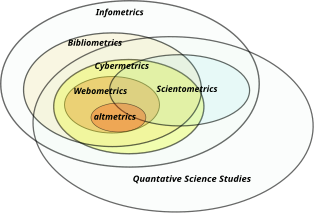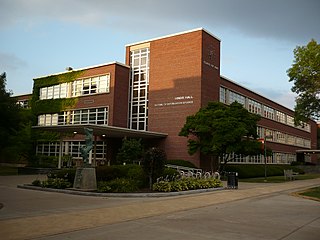
Information science, documentology or informatology is an academic field which is primarily concerned with analysis, collection, classification, manipulation, storage, retrieval, movement, dissemination, and protection of information. Practitioners within and outside the field study the application and the usage of knowledge in organizations in addition to the interaction between people, organizations, and any existing information systems with the aim of creating, replacing, improving, or understanding the information systems.

An academic discipline or field of study is a branch of knowledge, taught and researched as part of higher education. A scholar's discipline is commonly defined by the university faculties and learned societies to which they belong and the academic journals in which they publish research.
The Faculty of Information (or the iSchool at the University of Toronto) is an undergraduate and graduate school that offers the following programs: a Bachelor of Information (BI), a Master of Information (MI), a Master of Museum Studies (MMSt), and a PhD in information studies, as well as diploma courses. As a member of the iSchool movement, the Faculty of Information takes an interdisciplinary approach to information studies, building on its traditional strengths in library and information science, complemented by research and teaching in archives, museum studies, user experience, information systems and design, critical information studies, culture and technology, knowledge management, digital humanities, book history, data science, and other related fields. It is located on the St. George Campus, in the Claude Bissell building at 140 St. George Street, which is attached to Robarts Library and the Thomas Fisher Rare Book Library.
Bonnie A. Nardi is an emeritus professor of the Department of Informatics at the University of California, Irvine, where she led the TechDec research lab in the areas of Human-Computer Interaction and computer-supported cooperative work. She is well known for her work on activity theory, interaction design, games, social media, and society and technology. She was elected to the ACM CHI academy in 2013. She retired in 2018.

The following outline is provided as an overview of and topical guide to library and information science:
The term Open Archival Information System refers to the ISO OAIS Reference Model for an OAIS. This reference model is defined by recommendation CCSDS 650.0-B-2 of the Consultative Committee for Space Data Systems; this text is identical to = 57284 ISO 14721:2012. The CCSDS's purview is space agencies, but the OAIS model it developed has proved useful to other organizations and institutions with digital archiving needs. OAIS, known as ISO 14721:2003, is widely accepted and utilized by various organizations and disciplines, both national and international, and was designed to ensure preservation. The OAIS standard, published in 2005, is considered the optimum standard to create and maintain a digital repository over a long period of time.

The Drexel University College of Computing & Informatics (CCI), formerly the College of Information Science and Technology or iSchool, is one of the primary colleges of Drexel University in Philadelphia, Pennsylvania. The College of Computing & Informatics has faculty and administrative offices, research laboratories, collaborative learning spaces, and classrooms located at 3675 Market Street Philadelphia, PA. The current dean is Yi Deng.

The Information School is the information school of the University of Washington, a public research university in Seattle, Washington. Formerly the Graduate School of Library and Information Sciences since 1984, the Information School changed its focus and name in 2001.

The Syracuse University School of Information Studies, commonly known as the iSchool, is one of the 13 schools and colleges of Syracuse University. It acts as a center for research and education in the policy, systems, service, and technology aspects of information management, information science, and library science. Established in 1896 as the School of Library Science, its name was changed in 1974 to reflect the growing information field. Syracuse University was the first library school to change its name in this way, hence its claim as "the original school for the information age." Starting in the 1970s, the school began to add new programs focused on information studies that aim to merge technology and management skills with an emphasis on human needs and behavior.
Music librarianship is the area of librarianship that pertains to music collections and their development, cataloging, preservation and maintenance, as well as reference issues connected with musical works and music literature. Music librarians often have degrees in both music and librarianship. Music librarians deal with standard librarianship duties such as cataloging and reference, which become more complicated when music scores and recordings are involved. Therefore, music librarians generally read music and have at least a basic understanding of both music theory and music history to aid in their duties.

Library and information science (LIS) are two interconnected disciplines that deal with the organization, access, collection, and regulation of information, both in physical and digital forms.

A digital library is an online database of digital objects that can include text, still images, audio, video, digital documents, or other digital media formats or a library accessible through the internet. Objects can consist of digitized content like print or photographs, as well as originally produced digital content like word processor files or social media posts. In addition to storing content, digital libraries provide means for organizing, searching, and retrieving the content contained in the collection. Digital libraries can vary immensely in size and scope, and can be maintained by individuals or organizations. The digital content may be stored locally, or accessed remotely via computer networks. These information retrieval systems are able to exchange information with each other through interoperability and sustainability.
The University of Texas School of Information is a graduate school and undergraduate school at the University of Texas at Austin, offering master's and doctoral degrees in information studies, as well as certificates of advanced study and an undergraduate minor. In 2021, they began offering a bachelor's degree in informatics. UT iSchool graduates find careers in archival enterprise, information architecture, information policy, information systems design and management, information usability, librarianship, multimedia design, museum work, preservation and conservation, and records management.
The following outline is provided as an overview of and topical guide to information science:

The UNC School of Information and Library Science(SILS) ( University of North Carolina at Chapel Hill) offers a bachelor's degree in information science, a master's degrees in library science and information science, a master's degree in digital curation, and a doctoral degree in information and library science as well as an undergraduate minor, graduate certificate programs, and a post-masters certificate.

The University of British Columbia School of Information is a graduate school at the University of British Columbia in Vancouver offering a Master of Archival Studies (MAS), a Master of Arts in Children's Literature (MACL), a Master of Library and Information Studies (MLIS), a DUAL Master of Archival Studies/Master of Library and Information Studies (MASLIS) and a Doctor of Philosophy in Library, Archival and Information Studies (Ph.D.). Founded in 1961 as the School of Librarianship, the iSchool is currently located in the Irving K. Barber Learning Centre. The school changed its name in 2020, but was previously known as the School of Library, Archival and Information Studies. UBC iSchool is an internationally ranked, multi-disciplinary school, ranked first in the world for graduate education in library and information management based on 2019 and 2020 QS ranking.
The Department of Information Studies is a department of the UCL Faculty of Arts and Humanities.








